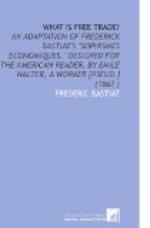So that the theory which we are discussing may be summed up in these two axioms:
“Utility is incompatible with justice at home,”
“Utility is incompatible with peace abroad.”
Now that which astonishes us, which confounds us, is, that a publicist, a statesman, who has sincerely adhered to an economic doctrine whose principle clashes so violently with other incontestable principles, could enjoy one moment’s calm and repose of mind. As for us, it seems to us, that if we had penetrated into science by this entrance, if we did not clearly perceive that liberty, utility, justice, peace, are things not only compatible, but closely allied together, so to say, identical with each other, we would try to forget all we had learned; we would say to ourselves:
“How could God will that men shall attain prosperity only through injustice and war? How could He will that they may remove war and injustice only by renouncing their own well-being?”
Does not the science which has conducted us to the horrible blasphemy which this alternative implies deceive us by false lights; and shall we dare take on ourselves to make it the basis of legislation for a great people? And when a long succession of illustrious philosophers have brought together more comforting results from this same science, to which they have consecrated their whole lives; when they affirm that Liberty and Utility are reconciled with Justice and Peace, that all these grand principles follow infinite parallels, without clashing, throughout all eternity; have they not in their favor the presumption which results from all we know of the goodness and the wisdom of God, manifested in the sublime harmony of the material creation? Ought we lightly to believe, against such a presumption, and in face of so many imposing authorities, that it has pleased this same God to introduce antagonism and a discord into the laws of the moral world?
No, no; before taking it for granted that all social principles clash, shock, and neutralize each other, and are in anarchical, eternal, irremediable, conflict together; before imposing on our fellow citizens the impious system to which such reasoning conducts us, we had better go over the whole chain, and assure ourselves that there is no point on the way where we may have gone astray.
And if, after a faithful examination, twenty times recommenced, we should always return to this frightful conclusion, that we must choose between the advantages and the good—we should thrust science away, disheartened; we should shut ourselves up in voluntary ignorance; above all, we should decline all participation in the affairs of our country, leaving to the men of another time the burden and the responsibility of a choice so difficult.
CHAPTER XV.
RECIPROCITY AGAIN.
The protectionists ask, “Are we sure that the foreigner will purchase as much from us, as he will sell to us? What reason have we to think that the English producer will come to us rather than to any other nation on the globe to look for the productions he may need; and for productions equivalent in value to his own exportations to this country?”




